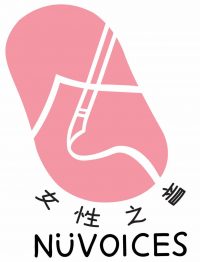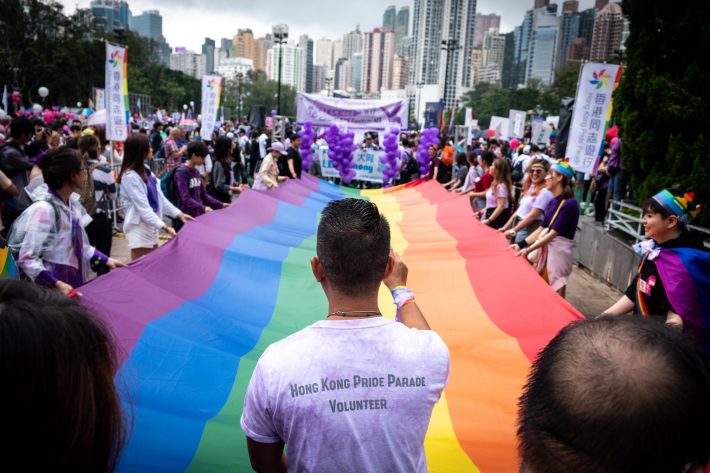BY ATHENA LAM
The LGBTQ+ community could do with more diversity. LGBTQ+ representation in Greater China, as with the rest of the world, is often stripped down to the image of cis-men (individuals who are assigned male at birth and identify with their assigned gender).
Strolling through Hong Kong’s Central District, Ximending in Taipei or Donghu Road in Shanghai would seem to verify that claim. Queer women and trans folk aren’t easy to identify, since women have more flexibility than men when it comes to their appearance (for example, short-cropped hair and business suits are common not only among men but also among women in the business world). While a quick stroll through popular gay clubbing districts may yield a fruitless search, queer women are far from invisible in Mainland China, Taiwan and Hong Kong.
In fact, queer women in Mainland China, Hong Kong and Taiwan form active communities with extensive reach – one just needs to know where to look in order to find them. Queer women, transgender and non-binary individuals often become publicly visible when influencers explicitly discuss LGBTQ+ issues, or through news reporting on such topics. The work they do is diverse, from organizing Pride events to establishing industry networks such as Shanghai’s Ladies Who Tech. With robust internet infrastructure in urban centres, queer women have created content that resonates with audiences across video live-streaming platforms, vlogs and podcasts.
As the United States gears up to celebrate Pride 2019, here are five podcasts to check out for those who want to learn more about LGBTQ+ culture in the Greater China region:
Taiwan

This podcast began in the summer of 2018 and is hosted by two expats, Bertus and Emmanuel, who live in Kaohsiung, Taiwan. The episodes have covered parts of gay culture in Taiwan, such as local labels and roles, but also tackled less visible topics such as bisexuality.
While there are no queer women who host podcasts in Taiwan, there are queer icons such as Zero Chou – known for her films featuring queer women – Youtubers, and a dedicated channel for queer women called LalaTai.
Language: English

Since 2015, Ron, the host for 笨瓜秀 (Ben Gua Xiu) pourquoi, has created a library of LGBTQ+ discussions that include film critiques, pop culture and social movements in Taiwan. The show grounds itself with local Taiwanese trends or upcoming cultural events. For example, it may delve deeply into selfie-culture and hairstyles, or discuss the cultural importance and implications of a queer drama remake of “Dream of the Red Chamber / Story of the Stone” and its use of Ximending’s landmark gay bar. In comparison to other podcasts, the show adopts a reflective tone and breaks up its hour-long episodes with music to give listeners time to digest many of the ideas or historical references that are touched upon.
Language: Mandarin
Hong Kong
Hosted by Brian Leung, “We are Family” is a program on the public broadcaster, Radio and Television Hong Kong (RTHK) Radio 2. The talk show began in 2006, making it the longest LGBTQ public radio program in the city. The show does not explicitly mention tongzhi (同志 or “comrade,” a term used by the LGBTQ+ community to refer to one another) or LGBTQ+ on its company website, which says it is a platform dedicated to covering sexual diversity. Yet its connection to LGBTQ+ is explicit in its Facebook group. The talk show focuses on contemporary debates and news on LGBTQ+ issues such as same-sex marriage, and attempts to bridge conversations in Hong Kong with global trends.
Language: Cantonese

TB Dan Da Yat Gei, which roughly translates into “Diary of Single Tomboys,” is a talk show hosted by a gaggle of queer women in Hong Kong. Their light-hearted discussions record topics that many queer women in Hong Kong consider at one point or another, from navigating lesbian dating apps, understanding straight women, and comparing Hong Kong and Taiwanese lesbian cultures to speculating on the growing number of women who identify as “Pure” (femmes who date femmes). A femme is a lesbian who is traditionally “feminine” with regards to their appearance and behaviour. The show is one of several themed programs produced by the queer production house Bubble Air. The iTunes podcast only has updates up until 2016, but new video episodes are still coming out on the BubbleAir website.
Language: Cantonese
Mainland China
In China, podcasts are the tip of the media iceberg in a fragmented market. Nonetheless, podcasts hold their own against their more popular cousin, video streaming. Lizhi.FM and Ximalaya are two examples of podcasting platforms where netizens can find queer audio stories, diaries or programming by LGBTQ+ community centres.
LesTalk covers all topics of interest to queer women in China, including LGBTQ+ identity and faith, how straight people see queer people, what life is like for the Chinese who have moved to the US, and life stages such as adoption. The talk show typically includes interviews, which offers readers insight into real lives and perspectives of people in same-sex relationships. Topics include public views on homosexuality and the constantly shifting cultural norms that people face every day.
Language: Mandarin

While China has been tightening its grip on LGBTQ+ issues, for instance by shutting down the world’s largest lesbian dating community Rela and cracking down on Pride events, Taiwan’s has legalized same-sex marriage. Hong Kong has swayed back and forth, obtaining some victories in the area of same-sex spousal visas but falling short of recognizing same-sex marriage. Marriage remains explicitly defined as a covenant between a man and a woman, according to Hong Kong Chief Executive Carrie Lam’s October policy address.
Chinese societies continue to lack sufficient legislation protecting the rights of LGBTQ+ individuals. However, laws tell an incomplete story of queer lives in Taiwan, Hong Kong and Mainland China. Queer Chinese nonetheless find ways to build communities, connect and share experiences. In fact, many podcasts hosted by Chinese women – including the NüVoices Podcast, Loud Murmurs, WoMen, TheFWordPodcast and Biedenuhai (別的女孩) – are openly discussing gender, societal expectations, and LGBTQ+ issues. Podcasts, video logs and informal groups help LGBTQ+ individuals create a far-reaching community.
By initiating discussions on non-mainstream gender topics such as the experiences of straight women who have queer friends, trans issues, or rural Chinese lesbians, such platforms give voice to the diversity of Chinese LGBTQ experiences. Though podcasts may not have entered mainstream media in these regions, they offer a safer outlet for individuals who may not want to reveal their full identities to engage in a public discussion and create visibility for queer women.
About the author

A Chinese Canadian who has lived and worked in East Asia for over 9 years, Athena is a content marketing consultant for B2B technology companies. She aims to showcase local Chinese and Japanese culture, talent, and overlooked stories for a global English audience. She provides local Japan and LGBTQ travel information on her blog thecupandtheroad.com and local startup information for Japan and Hong Kong at b3p0.org.
Website: www.thecupandtheroad.com
LinkedIn: https://www.linkedin.com/in/athenaylam/
Instagram: thecupandtheroad
Twitter: cupandtheroad
About the editors
Rosie Hudson is a Chinese-British freelance editor and experienced educator. Now based in Hong Kong, she has worked in diverse cities across the world including Hanoi, Manchester, Durban in South Africa and parts of Western Australia. Originally from Hong Kong and the United Kingdom, she is a graduate of the University of Essex, where she studied English Language and Linguistics. Reach out to her regarding freelance editing commissions and media-related jobs at rosiejhudson (at) gmail.com
Jessie Lau is a writer, editor and researcher passionate about exploring gender, ethnicity, social policy and identity in China and other parts of Asia. Based in London and Hong Kong, she has written stories on everything from pro-democracy protests in Hong Kong and solitary confinement in Californian prisons to China’s massive boarding school program targeting ethnic Uyghur and Tibetan children. Now freelancing as a video news assistant at The Associated Press, her writing has been published by the The Economist, Quartz, and South China Morning Post, among others. She is a board member at NüVoices, a collective supporting women working on China subjects, and Online Editor-in-Chief of NüStories, its feminist magazine amplifying minority voices.
Twitter @_laujessie Website: www.laujessie.com

